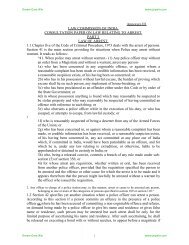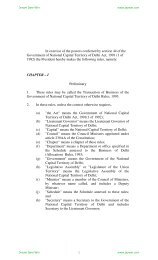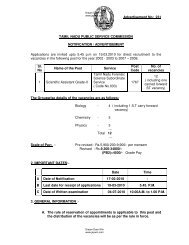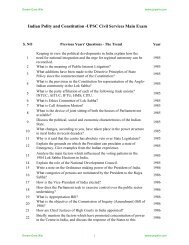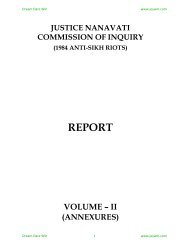Report 202 â Proposal to amend Section 304-B IPC Dowry ... - Jeywin
Report 202 â Proposal to amend Section 304-B IPC Dowry ... - Jeywin
Report 202 â Proposal to amend Section 304-B IPC Dowry ... - Jeywin
You also want an ePaper? Increase the reach of your titles
YUMPU automatically turns print PDFs into web optimized ePapers that Google loves.
26<br />
the Code makes it manda<strong>to</strong>ry for the court <strong>to</strong> record “special<br />
reasons” for not applying the provisions of <strong>Section</strong> 360.<br />
<strong>Section</strong> 361 thus casts a duty upon the court <strong>to</strong> apply the<br />
provisions of <strong>Section</strong> 360 wherever it is possible <strong>to</strong> do so<br />
and <strong>to</strong> state “special reasons” if it does not do so. In the<br />
context of <strong>Section</strong> 360, the “special reasons” contemplated<br />
by <strong>Section</strong> 361 must be such as <strong>to</strong> compel the court <strong>to</strong> hold<br />
that it is impossible <strong>to</strong> reform and rehabilitate the offender<br />
after examining the matter with due regard <strong>to</strong> the age,<br />
character and antecedents of the offender and the<br />
circumstances in which the offence was committed. This is<br />
some indication by the legislature that reformation and<br />
rehabilitation of offenders and not mere deterrence, are now<br />
among the foremost objects of the administration of criminal<br />
justice in our country. <strong>Section</strong> 361 and <strong>Section</strong> 354(3) have<br />
both entered the statute-book at the same time and they are<br />
part of the emerging picture of acceptance by the legislature<br />
of the new trends in criminology. It would not, therefore, be<br />
wrong <strong>to</strong> assume that the personality of the offender as<br />
revealed by his age, character, antecedents and other<br />
circumstances and the tractability of the offender <strong>to</strong> reform<br />
must necessarily play the most prominent role in<br />
determining the sentence <strong>to</strong> be awarded. Special reasons<br />
must have some relation <strong>to</strong> these fac<strong>to</strong>rs. Criminal justice<br />
deals with complex human problems and diverse human<br />
beings. A Judge has <strong>to</strong> balance the personality of the<br />
offender with the circumstances, situations and the reactions<br />
and choose the appropriate sentence <strong>to</strong> be imposed.” (para<br />
14).<br />
2.7.3. The Hon’ble Supreme Court further observed:<br />
“It should be borne in mind that before the <strong>amend</strong>ment of<br />
<strong>Section</strong> 367(5) of the old Code, by the Criminal Procedure<br />
Code (Amendment) Act, 1955 (26 of 1955) which came in<strong>to</strong><br />
force on 1.1.1956, on a conviction for an offence punishable<br />
with death, if the court sentenced the accused <strong>to</strong> any<br />
punishment other than death, the reason why sentence of<br />
death was not passed had <strong>to</strong> be stated in the judgment. After<br />
the <strong>amend</strong>ment of <strong>Section</strong> 367(5) of the old Code by Act 26<br />
of 1955, it is not correct <strong>to</strong> hold that the normal penalty of<br />
imprisonment for life cannot be awarded in the absence of



